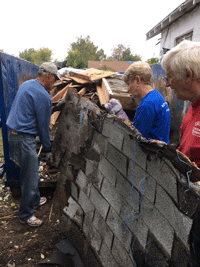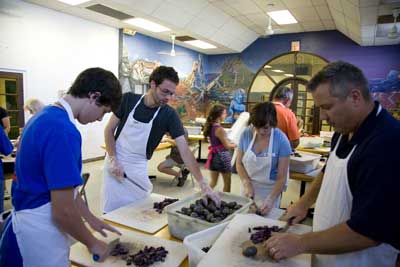Dr. Allen Hilton
What is mission? To this question, a cross-section of Christians would offer three main answers.
“Mission is evangelism,” say some. Jesus calls his followers to ‘make disciples of all nations,’ ‘be his witnesses in Jerusalem, Judea, Samaria, and to the ends of the earth,’ and offer the ‘message of reconciliation’ between God and people. (Matthew 28.16-20; Acts 1.8; 2 Corinthians 5.11-21) Powerful missionary biographies track twenty centuries of the nearly-miraculous transmission of the Christian good news to those who haven’t heard. Mission obviously means spreading the gospel.
“Au contraire,” cries another. “Mission is service!" John the Baptist told people with two cloaks or two cans of tuna to hand one to a neighbor without. Jesus met need with help; and in a powerful moment before his trial and death, he called all of us to feed the hungry, give drink to the thirsty, clothe the naked, welcome the stranger, visit the sick and imprisoned. (Luke 3.11; Matthew 25.36-40) Pinnacle members experience God’s work through direct service in Haiti or at Open Table. Mission is helping the least of these.
A third voice interrupts: “No, justice is mission! Moses brought Pharoah down. John the Baptist told power-brokers like tax collectors and soldiers not to extort their status inferiors. Mary celebrated and Jesus preached God’s intention to raise the poor and the hungry from their lowly station and bring the rich down a peg. (Exodus 3—12; Luke 3.12-14; Luke 1.46-55; 6.20-21, 24-25) Christians do mission when we call a congressperson or march for the rights of the voiceless. Mission is doing justice!”
Which is it, then? Some do argue an either/or choice, but I say both/and/and. Evangelism, charity, and advocacy all deserve a loud “Amen!” Robustly missional Christians and churches do all three.
In fact, I propose a fourth kind of mission – call it Mission 4.0. Here’s a clue: you’ve been doing this kind of mission for a while, and you haven’t even known it.
Last Sunday, as American emotions are running hot around terrorism and its link to radicalized Islam and how both connect to immigration policy, 125 Pinnacle people gathered in the chapel to do a hard thing. We asked the controversial question: “Is the U.S. a Christian nation?” We listened to one another – even listened for God through one another. No vote was taken, no resolution passed. We simply set out to listen when most Americans are shouting, to imagine that our opposites are also trying to get this right – even to imagine how our differences might help us. Our Courageous Conversation was civil and mutually affirming. We left a little less divided.
So, was that hour education? or fellowship? It had elements of both, and a survey at the back door would have produced both answers. But here’s something odd: whenever Jesus tells his disciples to “love one another as I’ve loved you” or prays for them and the people who come to church with them, that “they all may be one” (John 13.34-35; 17.20-23) – in fact, whenever he pictures his followers staying together through difference, Jesus says it will change the world. People will know that we’re Jesus people, he says, by the way we love one another.
Christian unity is mission, too, friends. When a white church pairs with an African-American church, when red listens to blue and blue to red, when difference comes together peacefully, God moves the world. This truth is both exhilarating and alarming. It thrills us, because faithful folk always look for more ways to reach the world with God’s love; it disquiets us because we have such a bad track record. Christians are infamous for being divided and divisive. Last Sunday we set out to change that record just a little; and because we gathered, the needle moved, and the world will change a little. God redeems the world when we do small things like that. God is very good!














